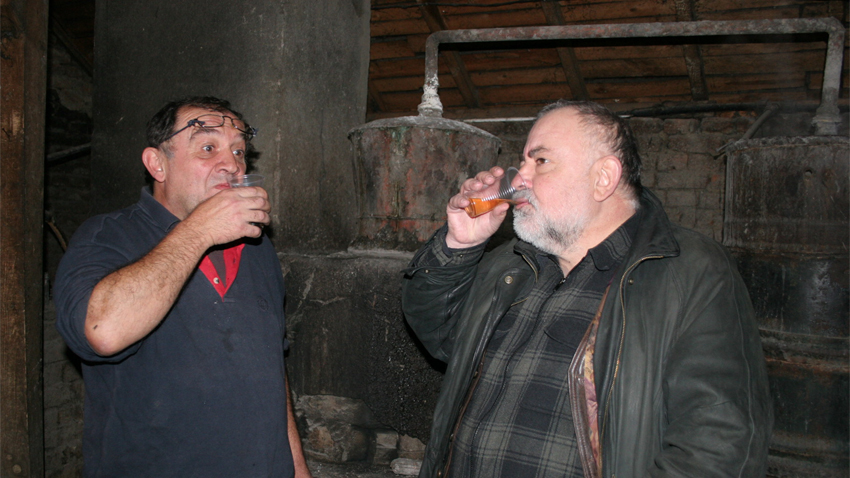In today’s Folk studio Associate Professor Dr Vihra Baeva from the Institute of Ethnology and Folklore Studies with the Ethnographic Museum, Bulgarian Academy of Sciences, talks about the traditional drink Rakia - Bulgaria’s best- loved alcoholic beverage, a remedy, a reason for good mood and entertainment and one of the symbols of the traditional Bulgarian feasts.
Rakia has a special place in Bulgarians’ everyday life. There are various types of rakia, but the most popular one is the grape brandy (grapa), also known in Bulgaria as Grozdanka. In some mountainous regions where people can not grow vines plum brandy, also known as Slivovitsa, is the most popular type of rakia. The towns of Troyan, Teteven and Tryavna (all situated in the Balkan Mountain Range) are still in a heavy dispute which town produces the best plum brandy. The region around Silistra (Northeastern Bulgaria) is popular with its high-quality apricot brandy. Rakia can be also distilled from apples, pears, cherries and even figs. The so-called Giulovitsa, which is made of oil-yielding rose grown in the Rose Valley near the towns of Kazanlak and Karlovo (Central South Bulgaria), is also very popular. This brandy was praised by renowned Bulgarian writer Luben Karavelov who dedicated to Giulovitsa a thrilling fragment from his novel entitled Mother’s Child: “Those who have not tried rose brandy from Kazanlak do not know anything about rakia. Oh, my lovely Kazanlashka Rose Brandy! Nearly a hundred volumes of the most- eminent periods of the Bulgarian history are hidden in your alcoholic sparkles. I am among those who enjoyed your great flavor…”, writes the classic of the Bulgarian literature Luben Karavelov.
Strong rakia also known as “skorosmartnitsa” (meaning "fast killer") is viewd as a good one. When the alcohol content is too low, rakia is slightingly called “partsutsa” or “shlyokavitsa” and is usually used as medicine. The phrase Weak Rakia (slaba rakia) refers to a person with a weak character and low influence. The phrase Rakia Time (rakieno vreme) is also widely used in Bulgaria - this is the hour when this traditional alcoholic beverage is served before dinner - around 6PM.

Good rakia is a matter of pride for each good host and the brewing of rakia is a typically male job. Going to the local brewing pot is a good occasion for all men who love to brew rakia to spend the whole day away from home. This time is usually filled with various stories, jokes and giggles, accompanied with the tasting of this fiery beverage during the brewing process. Bulgarians use rakia to treat various illnesses and pains. In cases of common cold, people drink heated rakia with added honey or caramelized sugar. When people suffer from tooth-ache they rinse their mouth with rakia. In cases of ear-ache, they put cotton soaked with rakia in their ears to ease the pain. Various types of tinctures used for medical treatment are also made of rakia.
Rakia is a must on the table of the Bulgarian people. Field workers have few sips of this strong beverage each day after exhausting work in order to relax. People go to the local pubs during national holidays to drink several shots of rakia with friends and chat with them for a while. Hosts welcome guests with rakia in Bulgaria. It is also widely used on weddings and christenings.
Rakia and wine are also part of the folklore literature. Both beverages are even personified in the images of White Rada and Red Petko. Rakia is often associated with love and marriage. A song of praise reminding of a church hymn was dedicated to rakia, where this strong beverage is glorified as a martyr, for the “sufferings it went through during the brewing process”.
In folklore fiction rakia usually appears in comic plots such as in the anecdote about Nasreddin Hodja and Sly Peter. Both men bought a common cask of rakia. Later, they departed to the nearby town to sell it and make some profit. However, Nasreddin Hodja got thirsty on their way to the town and asked Sly Peter to pour him some brandy worth a copper coin. Later, Sly Peter also became thirsty. He drank the same quantity of rakia and paid Nasreddin Hodja with the same copper coin. Then it was again Nasreddin Hodja’s turn to drink some rakia…. Thus, both men exchanged the same copper coin until they ran out of rakia. They never made it to the town market.
English version: Kostadin AtanasovThe 14th World Folklore Championship, "World Folk 2024" , starts today and runs until August 30 at three locations on Bulgaria's Black Sea coast: Nessebar, Sunny Beach and Sveti Vlas. The event kicks off tonight at the Jana Chimbuleva Amphitheatre in the..
Esther Willems from the Netherlands continues to attract people from different cities and nationalities to her club for Bulgarian folk dances, established in The Hague and named "Zora". It was founded in 2017 and then 13 people..
In the middle of August in Kyustendil, Southwestern Bulgaria, the "Panagia - Raising of the Bread" holiday takes place. The holiday is directly related to the church holiday "Assumption of the Blessed Virgin Mary", marked on August..

+359 2 9336 661
